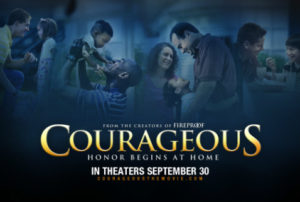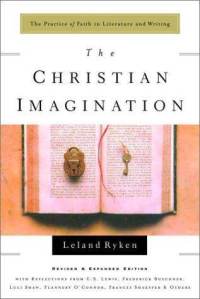Human Nature 3: Showing A Savior Isn’t Enough

Human heroes got your back. But only the true Christ yanked back His enemies, from Hell, and brings us into perfect joy in Him.
Tough decision this week — should I continue the Human Nature series with its final part, or offer a followup to last week’s thoughts about the contemporary Christian film Courageous? Well, as Tony Stark would say, “Is it too much to ask for both?”
Series recap: many stories include mainly external enemies, often from a lineup of usual suspects. But great stories will emphasize our greatest battle: against our rebel flesh.
Now I hope to apply this specifically to Christians. I believe any story that includes themes of good and evil, in which good ultimately wins, will reflect much of God’s truth. This can’t be helped, because this universe is His Story, and we’re just living in it. Even storytellers who overtly reject God are still stuck in His world. They can’t choose not to use His material, only to take some of it to echo, twist, or to try using as little of as they can. Even those who make “colorless” movies still film in hues of black and white.
As author Chad Walsh says, this truthful paradox is very freeing. “The Christian lives in the roomiest house that seems to be available,” he says in The Christian Imagination (page 170). “Writers who become Christians discover that they have only their [faith’s] negations to lose. The affirmations that other faiths make, Christians can mostly second—with appropriate footnotes, of course. Their negations must be denied.”
So, say, when a story shows us evil, optimally without glorifying its actions and effects, Christians can applaud. Yes, the world is a sick place. Scripture is clear that we shouldn’t pretend all is well. (For more, see Brian Godawa’s awesome defense of horror stories.)
But here’s the footnote: the world isn’t all like that. Even a fallen world praises God (as the Psalms show). Moreover, God will redeem the world, into a New Earth (Rev. 21).
Secondly, when a story shows heroes who make right choices, despite their inner and outer enemies, Christians can affirm that. For Scripture is clear that unsaved people can do good things, even make right choices. Christians have even more motivation for this.
But another footnote: in real life, no one can carry this on forever, in ways sufficient to please our perfectly loving and holy Creator, apart from the death and life of Christ.
Which brings me to Courageous, and some responses to it, and any other Christian story that purports to show a savior-like character. These may even mention Jesus, and — this is important — are not by themselves harmful or evil. But they are certainly harmful if we assume this is the only or best kind of story Christians have to share with others.
Epic-Story echoes: expecting too much
I thought more of this just yesterday, when I read Anthony Parisi’s gracious criticisms at White Horse Inn, of Courageous. Though I agreed with many of his thoughts, others at least need some qualification. That’s especially true for this seeming contradiction: how can we say that any story doesn’t have enough clear Gospel in it and could come off as moralistic, then also suggest that Christian art shouldn’t be reduced to sermon vehicles?
I think I, and other discerners/enjoyers of Christian stories, get more things confused when we don’t consider the differences between stories’ themes and audiences.
Christians can offer stories to two kinds of audiences: 1) other Christians, for the joy, encouragement, and education of the Church; 2) non-Christians. (In my view, our stories for each group ought to be much more alike, but that’s another column topic.) And within each audience are two subsets of story themes — its truth-echoes.
One subset echoes the Epic Story of the Bible, that is, the Story’s main point, the Gospel.
Another subset will act much like the subplots Scripture gives us, that is, the accounts of people who, whether good guys or bad guys, play smaller parts in the Epic Story. They point to that Story. But they don’t always include the whole thing. (The same is true of all Christians’ real lives: we echo the Story, but in part; our stories are only its subsets.)
So if I hear a Christian’s fiction and expect overt Epic Story echoes, when that wasn’t his goal, and then go off to criticize the story for not being clear enough, that doesn’t allow for the story’s genre. I might as well fault Esther for not giving King Xerxes John 3:16.
 I think maybe some critics of Courageous expected more beyond the filmmakers’ goals. They said they did not want to make “just a story,” or, conversely, to make a film that only preached the total Gospel, making it absolutely clear all the time that Jesus is the true Hero and we can do nothing apart from Him. Despite what I think were flaws in the movie’s sermon- or story-telling, their goal seemed to be to show how that Gospel, once assumed, can affect a Christian’s life. (Whether the film succeeded is another issue!)
I think maybe some critics of Courageous expected more beyond the filmmakers’ goals. They said they did not want to make “just a story,” or, conversely, to make a film that only preached the total Gospel, making it absolutely clear all the time that Jesus is the true Hero and we can do nothing apart from Him. Despite what I think were flaws in the movie’s sermon- or story-telling, their goal seemed to be to show how that Gospel, once assumed, can affect a Christian’s life. (Whether the film succeeded is another issue!)
If even God could wait until the very last decades of His inspiration of the Scripture, to give more-overt answers about His plan in a few dozen years than He had given us in centuries, surely there’s a place for stories that only foreshadow and hint at the Gospel.
And in these stories, we’ll surely find flawed heroes — heroes, “messiah” figures, who point to Christ. They do this throughout the Bible, and Jesus Himself endorsed these interpretations. He said He was the Son of David (Mark 12: 35-37). And He referred to Jonah’s experience in the fish’s belly for three days as a foreshadowing of His own death (Matt. 12: 39-41). Obviously then, Jesus had no problem if people wanted to compare Him with other “messiah” figures who sinned or who didn’t represent Him completely.
This would implicitly endorse more manmade stories about flawed heroes who remind us of Jesus, or at least echo the echo of Jesus — maybe not a Christ-figure, rather a “Christ-figure-figure,” a picture of what our attempts to imitate Christ will look like.
Epic-Story echoes: expecting too little
But with that said, now we come to this series’ conclusion, and a few more highly trendy complaints (I hope gracious ones!) about many stories marketed to Christians.
That’s because there seems to be a frequent assumption that, as Becky wrote Monday, if a story is “family friendly,” Christians should love it. Or that if a story includes a hero, even one who risks his life to save others, we’ve somehow included the full Gospel. Or that if we mention God, or even Jesus Christ, at all, and faith in Him, and even trusting in Him or Taking a Leap of Faith, that makes a story not only Christian “enough,” but fully Christian — and well worth Christians’ support, awareness, purchase, and popularizing.
Again, I don’t suggest these stories are not Christian, or that we should boycott them.
But do we confuse definitions? Why treat subplot stories as if they’re big-Story stories? Why do we encourage Support for these stories more than support for other, secular stories that include saviors? Moreover, why would Christians react as if only this kind of story is the epitome of Christ-glorifying storytelling and “safe,” “family-friendly” fare?
This may be best shown when more-conservative Christians react to the latest sports or inspirational movie marketed to family-friendly folks, or when more culturally-aware Christians promote, say, a violent R-rated war flick. (I have nothing against either kind of film; these are examples.) Their reasons for supporting these are like this: The movie shows human heroes and saviors. People die or sacrifice themselves to rescue their friends.
Those are all good morals. But they’re not the best or only kinds of Christian stories.
If we want to show all the Christian worldview in our stories, and explore a wide range of tales that reflect God’s truths and beauties, showing a human savior isn’t enough.
A human savior-figure who saves his friends, or saves anyone from Outside Enemies, is certainly close to being like the true Savior, definitely better than many alternative plot concepts. But the true Savior saved His enemies from themselves and their human nature, to make them His friends. Not all Christian stories reflect that. More should.
And I believe many Christians need to stop reducing the Gospel in stories to what others call “moralistic, therapeutic deism,” to appeal to the most amounts of people we can. Folks, many of our “haters [are] gonna hate” anyway. Do we recognize that?
Meanwhile, we already have a glut of secular stories that give “family-friendly” values, and morals, and heroes who sacrifice themselves, and things like that. But we are the only ones who can give specific Epic-Story echoing stories. Why miss out on the chance to be unique, and to explore themes few others do — such as savior-figures or human heroes who imitate Christ (consciously in the story-world, or otherwise) by saving not just their friends, but enemies, even as they fight their own human nature?











































One of my first thoughts near the end of the article is the figure of Emeth in the Last Battle…but that is tangled with accusations of universalism and perhaps not the best example.
I also thought of the many times the Doctor gives his enemies a chance–especially the Master, but that’s not quite right.
Thanks for checking out my review at White Horse Inn! It’s great to see someone interacting with my points in specific and thoughtful ways.
You write; “Though I agreed with many of his thoughts, others at least need some qualification. That’s especially true for this seeming contradiction: how can we say that any story doesn’t have enough clear Gospel in it and could come off as moralistic, then also suggest that Christian art shouldn’t be reduced to sermon vehicles?”
I think that’s a great question and brings out some of the challenges I really wrestled with in putting my article together. To describe my thought process at least … I decided that since the Kendricks put together a film that was largely about a message and existed primarily for this purpose (I’ve heard John Piper and others rightly refer to it as a “sermon-movie”) that to interact with the film essentially comes down to discussing it’s message. I figured if that’s what they sought to do I would meet them at that level and spent most of my review on this.
However, what I tried to touch on toward the end (I didn’t have much space to elaborate further, though I added a little more in the comments) is that this isn’t a great starting point anyway. Art is for so much more than spreading messages, and when that’s your main goal you usually shortchange the craft and it becomes cheap and didactic. A famous quote goes “If you want to send a message, call Western Union.” Art can accomplish many things. It can foster beauty, imagination, understanding, empathy … or even just raise questions. Too many Christians today only see value in a film if it has a message they agree with and I think that’s a huge problem that colors conversation in this area. Even if Courageous had a more comprehensive ‘Christian message’ or was more gospel-centered, that would in no way have guaranteed its quality. I’ve seen plenty of movies and music with fine messages that were terrible. My main problem with Courageous was that I thought it was a lousy movie. I think it’s emphasis and theology plays into that, but there’s a lot more factors to consider for sure.
Anyway, just thought I’d provide some clarity as you think about this. Thanks so much for reading my post and writing in this area. The Christian Imagination is a great compilation of writings with a lot of excellent work in it! Glad to see that being quoted.
Anthony, thanks much for your followup to my followup. (In fact, somehow I had missed your name before, and now I’ve edited the above column to include the attribution.)
Among much of what we discuss on Speculative Faith is that problem, if it is a problem, of art preachiness. You’d likely agree that it’s not just Christian stories that suffer from this. That is why I do believe some criticisms of Courageous, and similar films, expect more than its makers intended to give. Most critics are critiquing the genre, then, but not necessarily the film itself, for being overly limited and a violation of what (as they say, and with which I’d mostly agree) the medium, such as film, is for.
I do believe, however, that Christians may find a place for stories that consciously imitate the Epic Story, the main message of the Gospel. These may not mention things like Jesus and the Cross, but they certainly can do this — optimally in a way that is patterned after real life, despite whatever fantastic genre upon which the story is based.
However, issues arise when Christians feel they must enjoy only stories patterned on the big Story, or only stories based on small stories, or only overtly Christian stories, or only non-Christian, art-as-art-and-for-no-higher-goal-to-honor-God stories. But, as you’re familiar with The Christian Imagination, this rhetoric is not new to you! In my view, we do need to dispense with art-for-its-own-sake slogans, though. Nothing is “for its own sake.” But I do recognize that some Christians may say that and mean “it glorifies God, just as even His fallen creation can do, and helps us enjoy Him.” If so, let’s say that. Let’s base our arguments for excellent and truth-based stories on “Christian Hedonism,” about which much of the “marketing” has already been done, thank God.
For further reading, taking the “pulse” of this sector of reactions to the film — and to similar films in the genre — I recommend last week’s An open letter to truly ‘Courageous’ storytellers. However, like you, I’m still trying to articulate my way to approach these issues, without calling into question the makers’ motives or falling into too much snarkiness at their expense. Toward that goal, I thank you for your example.
I’ve seen Ted Dekker and Karen Kingsbury write this sort of thing, and it always comes off derivative. As soon as you write the good Christ-figure sacrificing himself for his enemies, we’ve left human sensibility. As Paul put it, “Very rarely will anyone die for a righteous person, though for a good person someone might possibly dare to die.”
I mean, gosh, Ted has killed the son of every character in his books at one point or another (although I haven’t read the last two years’ crop, so I don’t know if he’s gotten tired of that). It’s gotten to where I’m all, “Uh oh, this guy has a son, he’s going to die for someone else sometime in this book …. OH LOOK I CALLED IT.” (Apologies to Ted.)
My point is, no human being loves their enemies and dies for them. That’s a supernatural thing, and even if we’re writing a supernatural character, it’s still hard to grasp a love like that.
I was trying to think of literary examples, and only books like A Tale of Two Cities or The Green Mile come to mind. But that’s still “for a good person someone might possibly dare to die”.
Stephen,
I have the “Christian Imagination” book and I agree that every Christian novelist should it.
Also, I would like to recommend Steve Turner’s Imagine as well. I just posted a review on my blog about it. I’ve read it twice and believe it is one of the most liberating books I’ve read (along with Word Pictures by Brian Godawa) on the role of Art in Christianity.
http://kammbia1.wordpress.com/2011/10/07/book-review-13-imagine-by-steve-turner/
I haven’t seen Courageous yet…so I won’t comment it on yet. I have seen Fireproof and thought it was a decent movie.
Stephen,
I finished reading the “Christian Imagination” and here’s my review:
http://kammbia1.wordpress.com/2012/03/06/book-review-19-the-christian-imagination-edited-by-leland-ryken/
Marion
Thanks, Marion!
I’m thinking I would pay a small sum to reprint, with permission, some of the wisdom in The Christian Imagination on Speculative Faith. Offhand right now, I consider Susan Wise Bauer’s essay on good and evil in speculative stories. She uses the example of horror novelist Stephen King and his frequent “externalization” of evil to demons and other monsters, versus the inherent goodness of humanity, and it’s great stuff.
Stephen,
Your are welcome.
Do you have a link to Susan Wise Bauer’s essay?
Thanks,
Marion